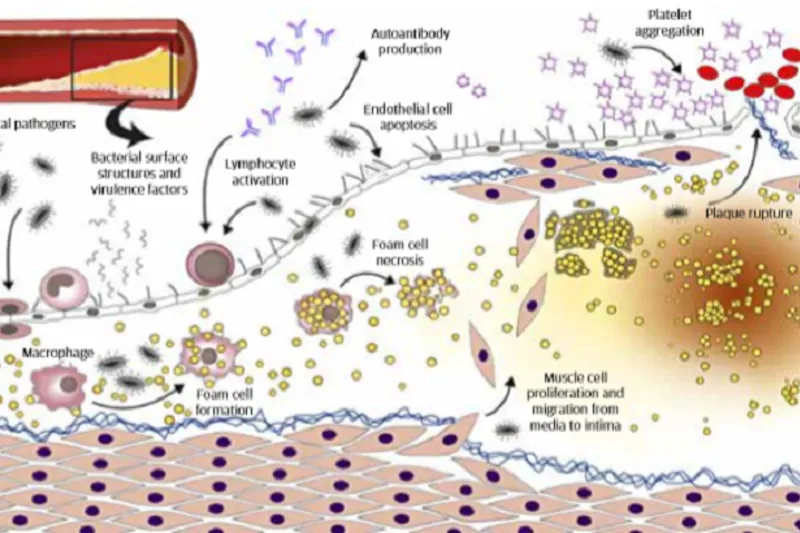Association between oral infections and cardiovascular diseases
Periodontal treatment has been shown to improve plasma levels of inflammatory (e.g. C-reactive protein and interleukins), thrombotic (fibrinogen) and metabolic (triglycerides, total cholesterol, HDL cholesterol, HbA1c, i.e. long-term blood glucose) markers and to improve blood vessel endothelial function. Periodontal treatment is thus beneficial for general health as well.

The association between chronic oral infections and cardiovascular diseases (CVD) has been established in several extensive epidemiological studies.
Most evidence is available on the association between periodontitis and atherosclerosis, and periodontitis has been recognised as an independent risk factor for CVD.
The association between periodontitis and heart disease risk is independent of confounding factors such as patient's smoking, age, sex, socioeconomic status or obesity.
From the infected gingival pockets of patients with periodontitis, oral bacteria and parts thereof may make their way into the bloodstream. In the arterial wall, periodontal pathogens have several proatherosclerotic effects.
Periodontitis also causes low-level systemic inflammation which contributes to the development of atherosclerosis. In addition, periodontitis has an unfavourable effect on blood lipid levels and alters hormonal regulation.
There are also some genetic factors that may predispose to both periodontitis and CVD.
Intervention studies have shown that with appropriate periodontal treatment, it is possible to impact CVD risk factors.
Periodontal treatment has been shown to improve plasma levels of inflammatory (e.g. C-reactive protein and interleukins), thrombotic (fibrinogen) and metabolic (triglycerides, total cholesterol, HDL cholesterol, HbA1c, i.e. long-term blood glucose) markers and to improve blood vessel endothelial function. Periodontal treatment is thus beneficial for general health as well.
Clinical relevance:
To date, there is strong evidence of the association between periodontitis and general health, and periodontitis is recognised as an independent risk factor for cardiovascular diseases. The effect of other oral infections on heart health requires further research. Inflammation is an important link between oral infections and CVD. Evidence shows that periodontal treatment has beneficial effects on general health. Identification of individual risk factors as well as prevention, early diagnosis and treatment of periodontitis promote heart health as well. Keeping the oral cavity, teeth and the tissues that support the teeth free of infection is thus of great importance.


